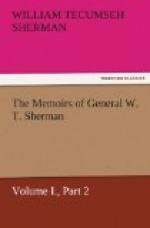All the details of our march to Knoxville are also given in my official report. By extraordinary efforts Long’s small brigade of cavalry reached Knoxville during the night of the 3d, purposely to let Burnside know that I was rapidly approaching with an adequate force to raise the siege.
With the head of my infantry column I reached Marysville, about fifteen miles short of Knoxville, on the 5th of December; when I received official notice from Burnside that Longstreet had raised the siege, and had started in retreat up the valley toward Virginia. Halting all the army, except Granger’s two divisions, on the morning of the 6th, with General Granger and some of my staff I rode into Knoxville. Approaching from the south and west, we crossed the Holston on a pontoon bridge, and in a large pen on the Knoxville side I saw a fine lot of cattle, which did not look much like starvation. I found General Burnside and staff domiciled in a large, fine mansion, looking very comfortable, and in, a few words he described to me the leading events, of the previous few days, and said he had already given orders looking to the pursuit of Longstreet. I offered to join in the pursuit, though in fact my men were worn out, and suffering in that cold season and climate.
Indeed, on our way up I personally was almost frozen, and had to beg leave to sleep in the house of a family at Athens.
Burnside explained to me that, reenforced by Granger’s two divisions of ten thousand men, he would be able to push Longstreet out of East Tennessee, and he hoped to capture much of his artillery and trains. Granger was present at our conversation, and most unreasonably, I thought, remonstrated against being left; complaining bitterly of what he thought was hard treatment to his men and himself. I know that his language and manner at that time produced on my mind a bad impression, and it was one of the causes which led me to relieve him as a corps commander in the campaign of the next spring. I asked General Burnside to reduce his wishes to writing, which he did in the letter of December 7th, embodied in my official report. General Burnside and I then walked along his lines and examined the salient, known as Fort Sanders, where, some days before, Longstreet had made his assault, and had sustained a bloody repulse.
Returning to Burnside’s quarters, we all sat down to a good dinner, embracing roast-turkey. There was a regular dining table, with clean tablecloth, dishes, knives, forks, spoons, etc., etc. I had seen nothing of this kind in my field experience, and could not help exclaiming that I thought “they were starving,” etc.; but Burnside explained that Longstreet had at no time completely invested the place, and that he had kept open communication with the country on the south side of the river Holston, more especially with the French Broad settlements, from whose Union inhabitants he had received a good




